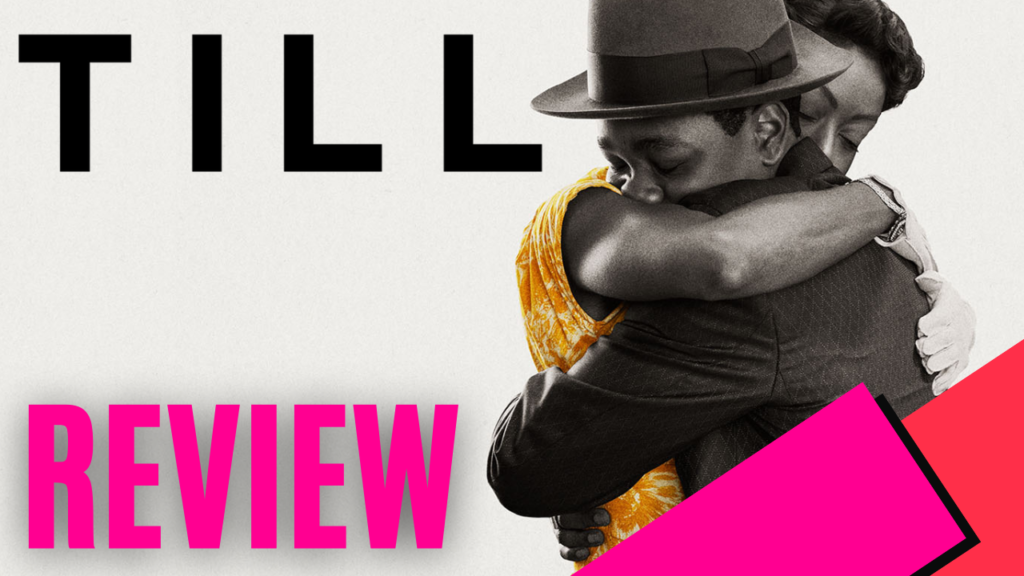
To capture the audience’s attention, you need a hook. Usually, “Based on a true story” is enough to gain interest, but when the true story is so affecting and culturally significant that it changes the course of history for an entire country, that should be a flashing billboard to see a film.
Till (2023) is a dramatic retelling of the real-life murder of Emmett Till, played here by the charming Jalyn Hall, told from the viewpoint of his mother, activist, and educator, Mamie Till-Bradley, portrayed by Danielle Deadwyler in award-winning form. Directed by Chinonye Chukwu, the film follows the events leading up to and surrounding the brutal lynching and murder of the 14-year-old Emmett, and the subsequent trial of his murderers.
If you are already familiar with the story, this movie will not show you anything new, but if you’ve never encountered the real-world tale, then you’re going to leave the theatre wondering how so many people can be so strong whilst others are so incredibly cruel. Tears were definitely shed during the screening, and several shocked gasps and expletives were heard throughout the theatre.

From the first moment, we see lead actress Danielle Deadwyler on screen as Mamie, and we are given access to a performance that shines brightest when shown the most restraint. Her great strength is, fittingly, showing great strength, and this is on display for the majority of the film. Her face is a cracking dam holding back a flood, but when the levee breaks we are granted the raw misery of a mother whose only son was so horrendously stolen from her.
Rarely, though, do any of the supporting cast get to shine as brightly. Jaylyn Hall as the titular Emmett is a rising star; charming, warm, and affectionate during his brief time on screen. Conversely, the legendary Whoopi Goldberg and the well-seasoned Frankie Faison as Mamie’s mother and father fade into the background and almost feel wasted here.
Sean Patrick Thomas as Mamie’s partner, Gene, is solid, though again, under-used, and the same goes for Carol McKenith as Willie Mae. Haley Bennett provides a subtle but infuriatingly smug Carolyn Bryant, the villain of the piece, though she barely speaks twenty words in the entire film.
Bonus points go to John Douglas Thompson as Moses “Preacher” Wright, who brings out some marvellous moments of turmoil, guilt, and deep sorrow when playing across from Deadwyler’s Mamie. However, due to Mamie being the focus of the movie, Preacher’s screen time is understandably short-lived.

Chukwu’s vision for this film frames a lot of scenes with, well, literal frames. We enter or exit various scenes through doorways and windows, setting the actors within compositions that are more like paintings or photographs than a movie.
Some interesting dynamic angles are cleverly used to draw the focus across the screen towards specific parts of the scene, whether it be an actor’s face, their eye-line, or in one pivotal moment, pointing directly at the camera in a dramatic revelation. At other times, Mamie is placed off-centre within the frame, exaggerating the space around her and giving a feeling of sincere loneliness that is heightened by Deadwyler’s intensely emotional performance.
This tense atmosphere is magnified by the orchestration, with swells of classical strings building to off-putting tones that increase the unsettling feelings of apprehension, coinciding with Mamie’s downward spiral toward the darkest moments of the film. Emmett’s favourite song is shown to be “He Beeped When He Should Have Bopped” by the incomparable Dizzy Gillespie, somewhat forced into the minds of the audience at the start of the movie, and this track reappears at various points as a thematic pin to draw the focus back to Emmett. It’s an old trick in cinema to use a character’s favourite song as a motif for said character.
It’s much easier for audiences to identify a character by the music surrounding their performance and the way it made them feel without having to actively think about it. Chukwu, and music supervisor, Abel Korzeniowski, use this trick several times throughout the film, and while it’s effective, it almost feels over-used by the end.

In 1955, the real-life Mamie Till-Bradley endured even worse things than what can be shown on screen, however, Ms. Till-Bradley decided to use the terrible events of that year as a catalyst for change in American society, educating and inspiring thousands to work towards a brighter future. She became a public speaker and a beloved school teacher, building knowledge and understanding as foundational tenants for children across America.
Unfortunately, the movie is limited in its runtime, and so seems to rush through the bare start of this journey for Ms. Till-Bradley, which feels like a shame since there is so much more that could be said for her work and achievements post-1955.
The lynching and murder of Emmett Till was an extremely important and culturally significant turning point for African Americans in a time of intense racial tension within the United States. This film highlights the systemic and overt racism within American society that was prevalent at that time and still persists to this day. It boggles the mind to think that some of the people who saw this happen in real life are still alive today, and at the time of writing this review, we are only 68 years removed from these events.
Till is an important film that brings to the forefront a heart-wrenching story of a real-life tragedy, but is also an opportunity to learn about the history that is closer than you think. If that doesn’t raise even the slightest ire within you, then you need to watch this film again.

The Good
- Danielle Deadwyler's performance is fantastic
- Interesting and dynamic cinematography
- Incredibly important subject matter that is still relevant today
The Bad
- Supporting cast are under-utilised
- Some musical motifs feel worn out by the end








